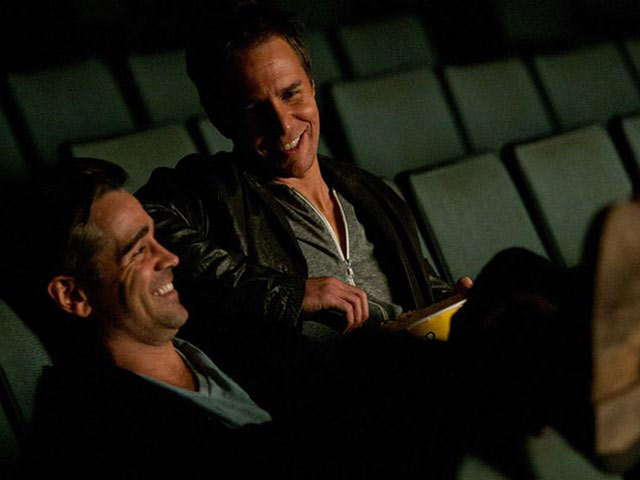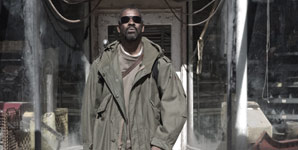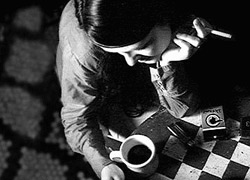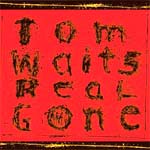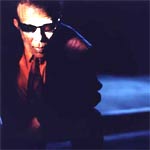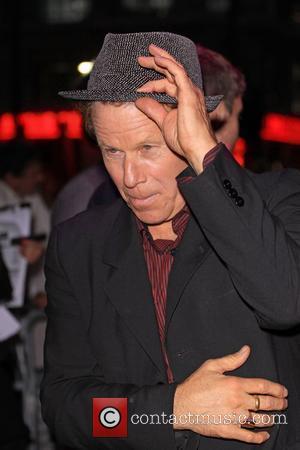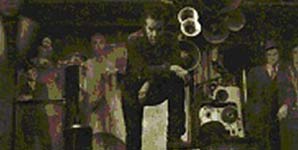While Waits has traditionally used voice as an actor, inhabiting each song with a different vocal character, on numerous songs here he uses it as a chugging, sputtering, wheezing, syncopated engine of sound and rhythm that can explode like a string of sidewalk firecrackers or sound like the dark incantations of a street corner shaman. * * *
“ The sun is up, the world is flat
Damn good address for a rat
The smell of blood
The drone of flies
You know what to do if
The baby cries”
(Hoist That Rag) Waits recorded hours of vocal sounds and rhythms in his bathroom at home, and he and Brennan began writing songs to them. Originally, Waits intended to capture the feel of the raw tapes with the trio -- Marc Ribot (guitars), Larry Taylor (bass) and Brain Mantia (percussion). He wanted to make a record more visceral and explosive then the more stylised, European, and intricately arranged Alice and Blood Money. But things changed when the band arrived. “I couldn’t find the textures anymore. The temptation was to send everyone home. But Mark Howard, the engineer, the band and Kathleen convinced me to transfer the tapes and just play live over them. Then the problem was -- what do you add to the song without collapsing it? What do you keep? Some we paste and cut. We used most all of our first takes and on the spot mixes. The band got it instinctively…we recorded a lot of songs. Some came out like old cars with new seat covers. Others never came together.” * * *
“ They’ll hang me in the morning on a scaffold yea big
To dance upon nothing to the Tyburn jig
Treats you like a puppet when you’re under its spell
Oh the heart is heaven
But the mind is hell”
(Sins of My Father) While it sounds like Waits looped his vocals, he says, “I didn’t want to do loops…so I did my mouth rhythms for the full length of the songs—sometimes longer. I wanted the inconsistencies in them—I’d overload the mic—so they didn’t sound like wallpaper.” Turntables first showed up on Waits’ 1999 album Mule Variations with Black Market Baby and Eyeball Kid, but here on Top of the Hill and Metropolitan Glide — songs Waits calls “contraptions containing both funk and r&b” — the turntable is used more for its spastic syncopation than for atmosphere, as it was before. “That’s Casey, (Waits’ son who also plays percussion on several cuts), he has that touch. I’ve been hearing turntables and underground hip-hop blasting in the house alongside Sullivan’s music (Waits’ youngest son) for years now. It’s all mixed in with the Lomax field recordings I listen to. And whatever Kathleen’s dug up.” * * *
“ Lay your head where
My heart used to be
Hold the earth above me
Lay down in the green grass
Remember when you loved me”
(Green Grass) The songs on Real Gone are some of the longest, groove laden Waits has ever recorded. It wasn’t his intention, Waits notes with a laugh. A couple of years ago, tired of working with large groups of musicians and inspired by all the new, stripped down retro blues and rock bands, Waits wanted to work in “primary colours. I was looking for the absence of sound. Initially, I was going to do three minute songs. Bread and water. Three legged tables. Nothing superfluous. But it’s not where the music took me … recording is like capturing birds or photographing ghosts, an uncertain enterprise.” On Blood Money, Waits added Brecht to his Weill. The lyrics to songs like God’s Away on Business and Misery Is the River were dark social commentaries and philosophical indictments of the human condition. Real Gone goes even further with Day After Tomorrow, a soldier’s wartime letter home. Without saying so, the song is obviously about the current political situation. This is a first for Waits.
“ My son and all of his friends are draft age and they are all headinginto the world and it’s looking like the whole world is at war,” Waitssays. Hoist That Rag and Sins of My Father also address events of the day withoutmentioning particular names, dates, or places, intentionally keeping the topicsmore universal and timeless. “It’s the well worn path of human behaviour,its ironies and its ills.” * * *
“ My baby went and left me
In a ’49 Ford
Going down the highway in a
’ 49 sword
My baby ripped my heart out
With every turn of the moon
Somebody told me there’s
Never been a rose with a thorn”
(Baby Gonna Leave Me) Waits’ lyrics have transformed from the Tin Pan Alley style and cinematic narratives of his earliest work through to the experimental and more abstract use of language as sound during the Eighties to arrive at the more spare and direct lyric form that started with Mule Variations. With Real Gone, he has blended the surreal absurdist qualities of the Eighties for the up-tempo songs, but the lyrics are more compact and conform more to the irregular meter of the blues or hollers. The ballads combine social documentaries and dark tales to weave morbid consideration of life’s pit and pendulum. The title of the record - - Real Gone -- references some of its themes: a lost mind, a renegade leader, war, love sublime, love lost, death, desire, escape … places and times beyond reach. It is also an expression used by musicians to describe the experience of playing and losing yourself to a place where you can finally be found. The record alternates between cacophonous, jubilant numbers and mournful, haunting and spare ballads. “Yeah,” says Waits in his pitchman persona, “Real Gone is an electric pill box, a homogeneous concoction of mood elevators, mind liberators, and downers, an alchemical universe of rattling chains, oscillating rhythms and nine-pound hammers. So check it out.” Real Gone is released on 4th October 2004 http://www.officialtomwaits.com
| 

